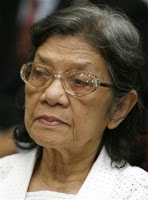IntLawGrrls |
| Posted: 13 Jan 2011 09:42 AM PST  The Pre-Trial Chamber of the Extraordinary Chambers in the Courts of Cambodia today confirmed and partially amended the Closing Order (analogous to an indictment) against the four regime leaders in custody and destined to become Case 002 before the ECCC. The four remain in provisional detention. The Pre-Trial Chamber of the Extraordinary Chambers in the Courts of Cambodia today confirmed and partially amended the Closing Order (analogous to an indictment) against the four regime leaders in custody and destined to become Case 002 before the ECCC. The four remain in provisional detention. The accused filed appeals filed against the Co-Investigating Judges' Closing Order. Most of the grounds of appeal were dismissed, but the  Pre-Trial Chamber did apparently require a specification as to the existence of a link between the underlying crimes against humanity and an armed Pre-Trial Chamber did apparently require a specification as to the existence of a link between the underlying crimes against humanity and an armed conflict, confirming that the so-called war nexus (about which we've blogged before) remained an element of crimes against humanity in the Khmer Rouge period. In addition, the PTC ruled that rape per se was not an enumerated conflict, confirming that the so-called war nexus (about which we've blogged before) remained an element of crimes against humanity in the Khmer Rouge period. In addition, the PTC ruled that rape per se was not an enumerated  crime against humanity at this time, but it was an "inhumane act" and so remained prosecutable under that moniker. crime against humanity at this time, but it was an "inhumane act" and so remained prosecutable under that moniker. |
| Experts to vet aspiring ICC judges Posted: 13 Jan 2011 03:00 AM PST  In anticipation of International Criminal Court elections, civil society has tapped several independent experts to vet candidates. In anticipation of International Criminal Court elections, civil society has tapped several independent experts to vet candidates.Honored to say that among those serving on the Independent Panel on International Criminal Court Judicial Elections will be an IntLawGrrls alumna. She's Patricia M. Wald (below left), formerly Chief Judge of the U.S. Court of Appeals for the District of Columbia Circuit and Judge of the  International Criminal Tribunal for the former Yugoslavia -- and, as demonstrated by prior IntLawGrrls posts, a leading proponent for the selection of exceptional judicial candidates. International Criminal Tribunal for the former Yugoslavia -- and, as demonstrated by prior IntLawGrrls posts, a leading proponent for the selection of exceptional judicial candidates.Joining Judge Wald on the panel convened by the Coalition for the International Criminal Court will be another woman, Dr. Cecilia Medina Quiroga (below right), Co-Director of the Human Rights Centre at the University of Chile and former President of the Inter-American Court of Human Rights (prior posts). Completing the panel are 3 men: Hans Corell (prior posts), former Under-Secretary-General for Legal Affairs and Legal Counsel of the United Nations; Justice Richard Goldstone (prior posts), former Prosecutor of the International Criminal Tribunals for Rwanda and the former Yugoslavia; and Judge O-Gon Kwon (prior post), ICTY Vice President and former Presiding Judge at the Daegu High Court in South Korea.  According to a CICC release, these independent experts will be tasked According to a CICC release, these independent experts will be taskedto help fill a significant gap in the procedures – the lack of a competent, fair, independent assessment of whether the nominees actually fulfil the qualifications prescribed by the Rome Statute.To do so, the experts will develop a vetting procedure like that some national bar associations use to evaluate domestic judicial candidates. Their yardstick will be Article 36(b) of the Rome Statute of the ICC, which states: (a) The judges shall be chosen from among persons of high moral character, impartiality and integrity who possess the qualifications required in their respective States for appointment to the highest judicial offices.  ICC States Parties are expected this year to put forward candidates for election by the ICC Assembly of States Parties, given that the 9-year terms of 6 ICC judges will expire in March 2012. ICC States Parties are expected this year to put forward candidates for election by the ICC Assembly of States Parties, given that the 9-year terms of 6 ICC judges will expire in March 2012. |
| Posted: 13 Jan 2011 01:04 AM PST  On this day in ... On this day in ...... 1616 (395 years ago today), Antoinette Bourignon de la Porte was born to a wealthy Catholic family in Lille, the Flanders city then part of a Dutch republic and now part of France. Upon coming of age she refused to marry; instead, she "served in a convent," "supervised an orphanage," and "began formulating her own spiritual philosophy." Bourignon would travel to villages throughout north central Europe, set up the press she'd brought with her, and print pamphlets attesting to her mystic belief system, known as "quietism." For her efforts she would be condemned by Protestant and Catholic leaders alike, but her ideas would retain currency long after her death in 1680. (Prior January 13 posts are here, here, and here.) |
| You are subscribed to email updates from IntLawGrrls To stop receiving these emails, you may unsubscribe now. | Email delivery powered by Google |
| Google Inc., 20 West Kinzie, Chicago IL USA 60610 | |


No comments:
Post a Comment